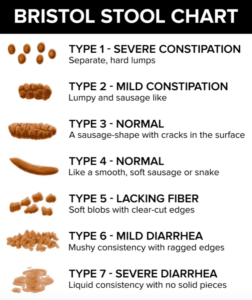Quick and dirty way to see if you are healthy; Checking your poop might just do that!
Hippocrates once said, “All disease begins in the gut.” Thousands of years ago, they already had wisdom about how important the gut is to our health. In recent studies, there has been mounting evidence of the relationship between the gut and overall health. Especially, the research in our “Gut Microbiome” is on the big wave. According to molecular biologist Joshua Lederberg, the gut microbiome is defined as the totality of microorganisms, bacteria, viruses, protozoa, and fungi, and their collective genetic material present in the gastrointestinal tract. These microorganisms in the gut microbiome produce butyric acid (short-chained fatty acid) that produces energy and suppresses inflammation. Butyric acid is known to prevent Irritable Bowel disorders, irritable bowel syndrome, colon cancer, and lower the risk of type 2 diabetes and obesity. By the stool test, we can find out about the health of our gut microbiome including the presence and balance of pathogenic and beneficial flora along with other general and nutritional status of the environment. It explains why good poop, good health makes sense!
Here are a few interesting facts;
-
The average number of cells in a human body is approximately 30 trillion. The number of microorganisms (4,000 to 10,000 different types of them) in a human body is approximately 38 trillion and 90% of them exist in our gut. One can say that the human body coexists with the gut microbiome in a symbiotic relationship. - Gut-associated lymphoid tissue (GALT) is the prominent part of mucosal-associated lymphoid tissue (MALT) and represents almost 70% of the entire immune system; moreover, about 80% of plasma cells [mainly immunoglobulin A (IgA)-bearing cells] reside in GALT (see the abstract here, credit to https://www.ncbi.nlm.nih.gov/pmc/articles/PMC2515351/)
- Lack of healthy gut microbiomes can trigger and/or affect the following conditions; atopic skin, thyroid conditions, Rheumatoid arthritis, Inflammatory Bowel Disorders, Irritable Bowel Syndrome, obesity, diabetes, fatty liver, colon cancer, depression, autism, Parkinson’s disease, dementia and more.
- 1 gram of riped kimchi has 1 billion counts of gut bacteria (primarily 3 types of probiotic bacteria – Leuconostoc, Weissella, Lactobacillus). Average Koreans consume 70-100 g of kimchi per day. It means they consume 70 -100 billion counts of them. Average probiotics contain about 5-10 billion counts per daily dosage.
Causes (Etiology)
A healthy gut microbiome can be damaged by
- Industrialized/processed foods
- Use of antibiotics/some medications
- C-sections (Babies get exposed to mother’s natural flora that provides microbiomes through natural/vaginal delivery)
- Excessive intake of highly processed foods, saturated/trans fats, sugar, gluten, soy, corn
- A low fiber diet that can cause inflammation (starving gut microbiome with little to no fibers start to damage the gut tissues by letting the microorganisms consume them)
Symptoms
that potentially indicating gut microbiome compromise are;
- Autoimmune diseases
- IBS/IBD
- Digestive complaints, diarrhea, or constipation
- Brain fog
- Skin problems, like acne and psoriasis
- Mood disorders, depression, and anxiety
- Diabetes and weight loss issues
Diagnosis
 Bristol stool quality: The diagnostic tool to classify the form of human feces
Bristol stool quality: The diagnostic tool to classify the form of human feces
GI-MAP: Stool test that uses PCR (Polymerase Chanin Reaction) technology.
Treatment, Self/home care
- Avoid the diet that destroys the healthy gut microbiomes as mentioned in causes.
- Consume a healthy amount of vegetables, fruits, and fibers,
- Healthy fats/fatty acids such as omega-3, EPA-DHA, olive oil
- Heathy amount of fermented foods: Kimchi, Natto, Yogurt, Kombucha, Keifer
- 5 healthy food of the world (voted by Health magazine, 2006) – Kimchi, Lentil, Natto, olive oil, yogurt (Greek)
- Probiotic/Prebiotic supplements: Check this link for Gut Health supports in our dispensary.
Based on the discussion above, the mapping of health and disease will change as changing the gut microbiome. By improving our gut health, one can solve many issues mentioned above. Following the recommended lifestyle will lead you to produce healthy poop! Let us know if you like to have a GI-MAP test. Genetics and ancestry affect us in our diet as well. While one needs to consider these factors as well, we will defer this discussion until our genetics discussion in the future!
Thanks for reading! Hope this helped!
Disclaimer: These statements have not been evaluated by the Food and Drug Administration. The products mentioned on this page are not intended to diagnose, treat, cure, or prevent any disease. The content in this blog should not be used as a substitute for the professional advice and/or recommendation of qualified healthcare practitioners or licensed physicians. The content presented in this blog is intended for information purposes only. Consult your doctor or healthcare practitioners for your current conditions.

ChiroPlus Wellness Care, LLC
303-750-3000
10700 E. Bethany Dr #207, Aurora, CO 80014